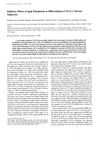 11 citations,
October 2015 in “Clinical and Experimental Dermatology”
11 citations,
October 2015 in “Clinical and Experimental Dermatology” Sophora flavescens extract helps hair growth and treats hair loss.
[object Object]  3 citations,
April 2022 in “International Journal of Molecular Sciences”
3 citations,
April 2022 in “International Journal of Molecular Sciences” Scientists turned mouse skin cells into hair-inducing cells using chemicals, which could help treat hair loss.
1 citations,
February 2024 in “Diversity” African plants can treat hair issues and may help with diabetes.
 November 2023 in “Research journal of pharmacy and technology”
November 2023 in “Research journal of pharmacy and technology” Medicinal plants may effectively treat hair loss.
 2 citations,
January 2023 in “Pharmaceuticals”
2 citations,
January 2023 in “Pharmaceuticals” Natural products and phytochemicals may help with hair regrowth, but more research is needed.
 1 citations,
March 2021 in “Current Dermatology Reports”
1 citations,
March 2021 in “Current Dermatology Reports” Various treatments help hair growth, but more research needed for safety and effectiveness.
January 2020 in “Indian Journal of Pharmaceutical Sciences” Natural products show promise for new hair loss treatments.
 47 citations,
March 2018 in “Journal of Pharmaceutical and Biomedical Analysis”
47 citations,
March 2018 in “Journal of Pharmaceutical and Biomedical Analysis” Researchers identified new compounds in Platycladi Cacumen and found variations in its flavonoid content, which could aid in its quality control.
 7 citations,
December 2021 in “Pharmaceutics”
7 citations,
December 2021 in “Pharmaceutics” Natural products like plant extracts can help promote hair growth and could be used to treat hair loss.
 11 citations,
March 2018 in “Protoplasma”
11 citations,
March 2018 in “Protoplasma” Lipopolysaccharides boost wheat seedling growth, but procyanidin B2 weakens this effect.
 22 citations,
June 2018 in “Journal of Neuroinflammation”
22 citations,
June 2018 in “Journal of Neuroinflammation” Procyanidins from grape seeds reduce nerve pain by blocking specific proteins and inflammation.
 98 citations,
May 2008 in “Archives of Dermatological Research”
98 citations,
May 2008 in “Archives of Dermatological Research” Eclipta alba extract helps hair grow faster and more effectively than minoxidil in rats.
 9 citations,
March 2009 in “European Journal of Dermatology”
9 citations,
March 2009 in “European Journal of Dermatology” Schisandra nigra extract may help hair grow by stimulating cells and preventing hair follicle damage.
 59 citations,
May 2014 in “Expert Opinion on Therapeutic Targets”
59 citations,
May 2014 in “Expert Opinion on Therapeutic Targets” The document concludes that targeting 5α-reductase, the androgen receptor, and hair growth genes, along with using compounds with anti-androgenic properties, could lead to more effective hair loss treatments.
 3 citations,
October 2009 in “Iranian Journal of Basic Medical Sciences”
3 citations,
October 2009 in “Iranian Journal of Basic Medical Sciences” Buxus wallichiana extract improves hair growth and has antioxidant properties, with oral use more effective than topical.
 1 citations,
January 2015 in “Journal of Pigmentary Disorders”
1 citations,
January 2015 in “Journal of Pigmentary Disorders” Treating melasma in men is difficult, especially for the deeper skin layers, and may need more than just topical treatments.
 1 citations,
October 2021 in “Gene, cell and tissue”
1 citations,
October 2021 in “Gene, cell and tissue” Grape sap may help reduce hair loss and promote hair growth in rats.
 15 citations,
July 2015 in “Journal of Essential Oil Bearing Plants”
15 citations,
July 2015 in “Journal of Essential Oil Bearing Plants” Thuja orientalis and Thuja occidentalis essential oils have medicinal properties useful for developing treatments with antimicrobial and bioactive effects.
 23 citations,
December 2013 in “Regenerative Medicine”
23 citations,
December 2013 in “Regenerative Medicine” Hair follicle culture helps develop new treatments for hair loss.
182 citations,
November 2018 in “Cosmetics” Seaweeds have beneficial compounds for skin care, including anti-aging and protective effects.
 9 citations,
June 2022 in “Reviews in Environmental Science and Bio/Technology”
9 citations,
June 2022 in “Reviews in Environmental Science and Bio/Technology” Maritime pine bark has various chemical components useful for different industrial uses.
[object Object]  1 citations,
April 2023 in “Biomolecules”
1 citations,
April 2023 in “Biomolecules” Fermented papaya and mangosteen in hair care products helped prevent hair loss and improve hair thickness.
 13 citations,
May 2019 in “Cancer Prevention Research”
13 citations,
May 2019 in “Cancer Prevention Research” Grape seed extract may safely and effectively help prevent lung cancer.
 1 citations,
January 2013 in “Springer eBooks”
1 citations,
January 2013 in “Springer eBooks” Cosmeceuticals may benefit skin health but need more research for efficacy and safety confirmation.
 18 citations,
January 2000 in “Food Science and Technology Research”
18 citations,
January 2000 in “Food Science and Technology Research” Apple polyphenols, especially from unripe apples, can help prevent cells from turning into fat cells.
 December 2023 in “Redox biology”
December 2023 in “Redox biology” The substance DMC helps get rid of aging cells by triggering a process that causes cell death, which could treat age-related diseases.

New treatments for hair loss should target eight main causes and use specific plant compounds and peptides for better results.
 8 citations,
April 2020 in “Journal of Ethnopharmacology”
8 citations,
April 2020 in “Journal of Ethnopharmacology” Herbs might help with hair loss, but more research is needed to confirm their safety and effectiveness.
 282 citations,
April 2007 in “Journal of Agricultural and Food Chemistry”
282 citations,
April 2007 in “Journal of Agricultural and Food Chemistry” Apple polyphenol, especially oligomeric procyanidins, can reduce fat absorption and lower blood fat levels.
 2 citations,
April 2018 in “Natural Product Communications”
2 citations,
April 2018 in “Natural Product Communications” Cynomorium songaricum has many health benefits and could help with hair regrowth.


























